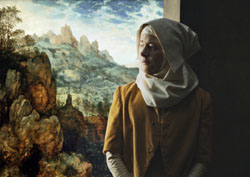Bombarded as our brains are with visual images from digital screens that dominate most aspects of life, an encounter with "The Mill and the Cross" triggers a kind of shock reaction.
A film that feeds on its own absolute quietude, "The Mill and the Cross" exudes a contemplative ambience that explains nothing and expresses volumes. Directed by Poland's Lech Majewski and adapted from a novel (same title) by Michael Francis Gibson, it transports the viewer inside Pieter Bruegel the Elder's famed painting "The Way to Calvary."
The Flemish master lived and worked in the mid-16th century at a time when Flanders was occupied by Spain and his country's Protestants were persecuted by direct orders from the Inquisition. Bruegel never protested outright, but he was said to have been heavily influenced by the dark, demonic Hieronymus Bosch, who weaved themes of torture and insanity into powerfully detailed paintings featuring hundreds of suffering people.


















With your current subscription plan you can comment on stories. However, before writing your first comment, please create a display name in the Profile section of your subscriber account page.